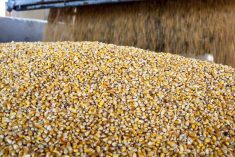Chicago | Reuters — Chicago Board of Trade grain and soy futures backpedaled from their highest prices in months on Wednesday as weather forecasts improved in Argentina, analysts said.
Traders have been closely monitoring dryness in Argentina because it is the world’s top exporter of soyoil and meal, the No. 3 exporter of corn, and competes with the U.S. for global sales.
Rain on Tuesday and Wednesday brought much-needed relief to crops in Argentina’s central farming region, especially to soybeans, after high temperatures and little moisture in January, the Rosario grains exchange said.
Read Also

Chinese importer buys Canadian canola after Carney visit
A Chinese importer bought a cargo of Canadian canola shortly after Canadian Prime Minister Mark Carney’s visit to Beijing last week, trader sources said.
Showers will also reach dry spots in northern Argentina in the middle of the month, according to Commodity Weather Group.
“Weather is your driving factor today, moreso than anything else,” said Jim Gerlach, president of brokerage A/C Trading.
Most-active CBOT March corn futures were down 1-1/4 cents at $4.93-1/4 a bushel, after earlier reaching the highest level since October 2023.
CBOT March soybeans were down 18 cents at $10.57 a bushel. They turned lower after hitting the highest price since late July.
CBOT wheat dropped 4-3/4 cents to $5.72-1/4 a bushel, after hitting its highest level since October.
Traders were assessing the potential for demand for China, the world’s biggest soy importer.
Agricultural markets had feared that tariffs proposed by U.S. President Donald Trump against Canada, Mexico and China could hurt demand for U.S. farm goods in a tit-for-tat trade battle.
Trump on Monday postponed tariffs against Mexico and Canada for a month, while Beijing announced limited retaliatory tariffs on U.S. goods on Tuesday that did not include crops.
Some traders predict that China may boost purchases of the oilseed from the United States as part of trade negotiations.
In a sign of weak Chinese demand, trade sources told Reuters that China had delayed imports of up to 600,000 tonnes of mostly Australian wheat and offered some of those cargoes to other buyers.
(Reporting by Tom Polansek in Chicago, Gus Trompiz in Paris and Naveen Thukral in Singapore; Editing by Rashmi Aich, Jan Harvey and Rod Nickel)














